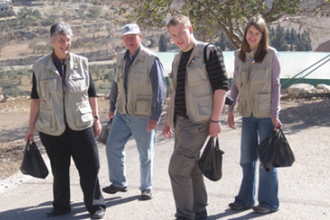Westminster: Cardinal Cormac's 2007 Christmas homily
In his Christmas Homily for 2007, given at Westminster Cathedral, Cardinal Cormac Murphy-O'Connor, highlighted the needs of the excluded in our society and the importance of Christian compassion towards the less fortunate. "The event we call Christmas, the birth of Jesus is evidently meant for everyone " said Cardinal Cormac Murphy-O'Connor , who stressed that it was important that Christians "should seek to ensure that nothing and nobody remains untouched by the tidings of comfort and joy that came from heaven on the first Christmas night." In the Homily, which was delivered at Westminster Cathedral, London during Midnight Mass (23.30 - 01.00), and broadcast live on BBC Radio 4, Cardinal Cormac Murphy-O'Connor, whilst acknowledging the need for immigration to be controlled, drew particular attention to the way in which migrants are treated. "A theme which is much in the news in Britain at the moment is the question of the many immigrant peoples who come to our country. Most immigrants come to our country because they wish to have a better life and work so as to provide for their families. What concerns me at the moment is our attitude as a nation to these many immigrants. Many of these people are trying, for perfectly good reasons, to enter Britain and they need to be welcomed. I understand that immigration needs to be controlled. However, Sometimes they must feel like Joseph when he returned to Bethlehem after exile in Egypt, simply excluded because they are outsiders. Do we perceive them as a threat to our well-being or to our way of life, or are we able to welcome people who need that welcome? Is there any room at our inn? Can we offer them tidings of comfort and joy, or do we simply close our doors? " Cardinal Cormac also emphasised the importance of helping others in need including the homeless: "If we always walk past the homeless men and women in our cities and never really look at them, never allow them to touch our hearts, something essential is missing in our idea of Christianity, and we find that, like the innkeeper in the Gospel, we cannot find any room at our inn." Full text follows God's messengers are not always given a great welcome. Those shepherds "who lived in the fields near Bethlehem "and took it in turns to watch their flocks during the night suddenly saw the angel of the Lord "and the glory of the Lord shone round them. They were terrified. If, like me, you have been in recent days to watch a school play about the birth of Jesus, the angel of the Lord was more than likely dressed up like some dainty creature out of Peter Pan or a Renaissance painting. There is nothing frightening there. But Luke's Gospel does not describe the angel's appearance all we know is that one of God's messengers appeared to some shepherds and scared them, so much so that the messenger had to reassure them that they had no reason to be afraid. The angel, God's messenger, had some news, "news of great joy, and, what is more, this joy was to be "shared by the whole people. These last words are significant, because God chose to reveal His "tidings of comfort and joy not only to the privileged and educated sages who were on their way from distant countries to come and worship the King, not only to holy men and women like Simeon and Anna, Joseph and Mary, but to "the whole people. Nobody was excluded. Everyone ought to benefit from this news. So the event we call Christmas, the birth of Jesus Christ, is evidently meant for everyone. But there is more than that: deep within our religion there has always been a strong belief that the birth of this baby had an effect not only on humanity, but on everything God ever created. The Psalm that is traditionally used at the Christmas midnight Mass is an appeal to the whole of creation to recognise the Lord of creation: "sing to the Lord, all the earth, we heard; and then there are these powerful words in the third verse: "Let the heavens rejoice and earth be glad. Let the sea and all within it thunder praise. Let the land and all it bears rejoice, All the trees of the wood shout for joy at the presence of the Lord For He comes, He comes to rule the earth. Twelve centuries later, Saint Francis of Assisi arranged with a friend in a village in central Italy to stage the first live crib, and it was Francis who first gave pride of place to the ox and the ass, convinced that if such animals had been there in the stable in Bethlehem, they would somehow be aware that it was a privilege to warm the air the infant Jesus would breathe. There are well-known episodes in the life of Francis that show he was convinced that the birth of Christ affected the whole of creation. He felt it was his duty to preach the Gospel not only to people, but also to birds and other creatures. His insight is behind the Franciscan tradition of care for nature, and is what we might call the seed of a medieval programme of Christian ecology. If we Christians really grasp the significance of the account of Christ,s birth in Luke,s Gospel, we should seek to ensure that nothing and nobody remains untouched by the tidings of comfort and joy that came from heaven on the first Christmas night. After all, the angel did say that these tidings are meant for "the whole people, for everyone. So how are we doing? Is the news of comfort and joy getting through to everyone? Or are there some people who never hear tidings of comfort and joy? We can start with the central characters in the Christmas story. Joseph and Mary were away from home because of the census, but so were many other people; as we know, when Jesus was born they "laid him in a manger because there was no room for them at the inn. Imagine how they felt. Joseph had returned to what had once been his home town but was now an outsider and had nowhere, perhaps no longer knew the people who might pull a few strings and squeeze him in somewhere. You would do that for family, obviously. But they had no joy and certainly no comfort that night, at least from a human point of view. They were outsiders and experienced the sort of exclusion that, sadly, is quite common in the Western world today. A theme which is much in the news in Britain at the moment is the question of the many immigrant peoples who come to our country. Most immigrants come to our country because they wish to have a better life and work so as to provide for their families. What concerns me at the moment is our attitude as a nation to these many immigrants. Many of these people are trying, for perfectly good reasons, to enter Britain and they need to be welcomed. I understand that immigration needs to be controlled. However, sometimes they must feel like Joseph when he returned to Bethlehem after exile in Egypt, simply excluded because they are outsiders. Do we perceive them as a threat to our well-being or to our way of life, or are we able to welcome people who need that welcome? Is there any room at our inn? Can we offer them tidings of comfort and joy, or do we simply close our doors? In a horribly real sense, there is "no room at the inn for all kinds of homeless people in Britain, an army of people whose numbers seem to be growing at an extraordinary rate each month. Someone told me recently that the members of a Catholic parish choir were singing carols in local pubs and collecting for a project to look after homeless people in a nearby town. They were dismayed at the number of people who refused to contribute, claiming that "it is their own fault. In a sense, it is not only heartless but pointless to ask why people are homeless. The typical reaction Jesus experienced when He saw people in real need is described in the original Greek Gospel texts by a word that means deeply moved with compassion, . The Gospel writers wanted to communicate what they had often noticed that Jesus almost physically felt people,s need for help. If we always walk past the homeless men and women in our cities and never really look at them, never allow them to touch our hearts, something essential is missing in our idea of Christianity, and we find that, like the innkeeper in the Gospel, we cannot find any room at our inn. But there I would say we have to return to that first Christmas night and hear again the message the angel brought to the shepherds "news of great joy, a joy to be shared by the whole people. Ultimately I think it is a question of whether we really believe in the God of Christmas. The God of Christmas is not light years away, living in another dimension. For us, Christmas means that God became one of our kind and lived a human life; in a sense God moved in nearby and is called "Emmanuel, a word that means "God is with us. God is with us! It is worth letting those words sink in. Not only did God come to be with us then; He has promised to be with us all days, until the end of time. So no wonder we repeat the words of the Gospel today: "I bring you news of great joy, a joy to be shared by the whole people. Today in the town of David a saviour has been born to you; he is Christ the Lord (Lk 2:11). Source: Archbishop's House















